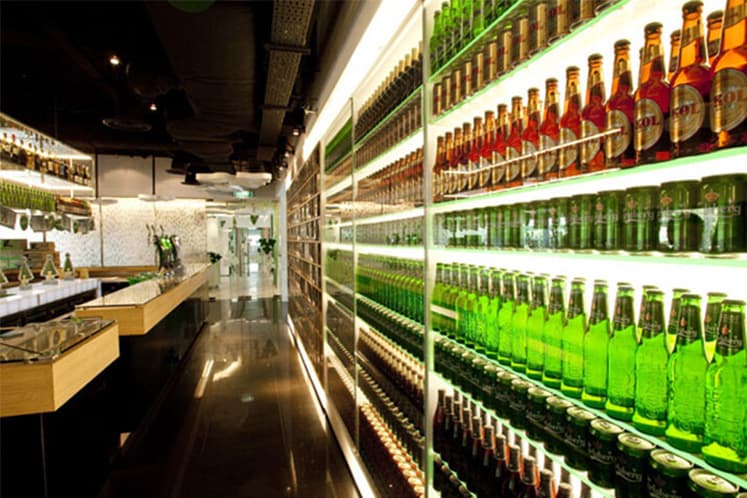
This article first appeared in The Edge Financial Daily on February 15, 2018
KUALA LUMPUR: After a solid 2017, Carlsberg Brewery Malaysia Bhd is optimistic in delivering an even better 2018 with continued sales growth expected for its Carlsberg and premium brands, as issues dragging its financial performance have largely been resolved.
This is also supported by special events such as the World Cup in mid-2018, when sales of alcohol products usually pick up, said its managing director Lars Lehmann.
“We are expecting that (a better bottom line in 2018),” Lehmann said at the results briefing for Carlsberg Malaysia’s financial year ended Dec 31, 2017 (FY17).
“We are committed towards organic operating profit growth, as well as to deliver more cash for our shareholders. We don’t think excess cash should just sit around [in] the company.”
Carlsberg yesterday reported an 8% rise in FY17 net profit to RM221.17 million from RM204.98 million in FY16. Revenue grew 5% to RM1.77 billion from RM1.68 billion.
The brewery is proposing a 66 sen final dividend plus 11 sen special dividend, bringing the year’s total to a multi-year high of 87 sen per share. It paid 72 sen per share last year.
At the same time, Carlsberg proposed a new dividend policy targeting 100% payout of the group’s consolidated net profit beginning FY18.
Payments will also be distributed quarterly, said Lehmann. The company traditionally announces the bulk of its total annual dividend when the financial year closes.
The brewery’s shares hit a record high of RM16.66 yesterday, after rising 18 sen or 1.09%, with a market capitalisation of RM5.13 billion.
Contraband curbs showing results
While consumers’ sentiments are likely to remain soft in 2018, the business environment is seeing an improvement as the Malaysian government’s measures to curb contraband beer sales are beginning to show results.
“I am happy with the progress [of the contraband curb],” said Lehmann. Internal estimates, he added, show around 5% to 10% market share of contraband beer in Malaysia has shifted to taxed alcohol drinks last year.
However, more work still needs to be done in “difficult places” such as Sabah and Sarawak where contraband beer still dominates with over 80% market share, he said.
The brewery also said it has seen the last of the trade offer adjustments incurred by its Singapore unit, mostly relating to discounts and trade marketing. The unit churned out another RM13.8 million in 4QFY17, bringing full-year total adjustments to RM26.7 million.
“It is about getting things right,” said Lehmann. “We thought 3Q [was] the end [of it] ... It is now final.” Though there may still be additional adjustments “by a few hundred thousands of ringgit here and there”, Lehman assured that it won’t be “in the millions”.
It is also business as usual for its 25%-owned Sri Lanka subsidiary Lion beginning this year. Its market share in that country has recovered to around 80% over the last few weeks, said Lehmann. The unit made a net profit of RM2.7 million in 4QFY17, from some RM3.2 million in losses a year ago.
“It is now operating at the optimum level; the flood [there] is behind us,” said Lehmann, adding that the company is expecting a final insurance payout of some RM5.6 million in the coming months.
Lion’s recovery, he said, is also supported by the changes in excise duty for alcohol products in Sri Lanka — previously unfavourable to beer products compared with other alcoholic drinks — to taxes based on alcohol volume — the international standard.
In Malaysia, the brewery’s move towards premiumisation has resulted in higher average selling price (ASP), backed by a 24% year-on-year (y-o-y) growth in premium brand sales last year. The Carlsberg brand trailed behind, registering 7% sales volume growth largely thanks to the Smooth Draught variant, said Lehmann.
Lehmann added that cost control and efficiency measures under the company’s “Fund The Journey” programme will continue moving forward.
A stronger ringgit can hurt
On a strengthening ringgit, Lehmann said for now, the foreign exchange’s (forex) impact is balanced out through the group’s US dollar-denominated hedging on aluminium and its sales in Hong Kong, combined with sales in ringgit here and in Singapore dollar across the causeway.
“But if there is continued recovery of the ringgit against the Singapore dollar throughout 2018 [excluding forex gains or losses in US dollar], that can hurt us quite a lot,” he said.
Lehmann also said any cost increases due to tax changes will trickle down to customers in the form of higher selling prices. While the sin tax in Malaysia has remained unchanged for 2018, the same cannot be said yet for Singapore. The city state is set to table its national budget on Feb 19.